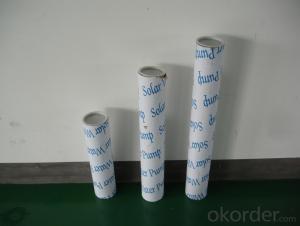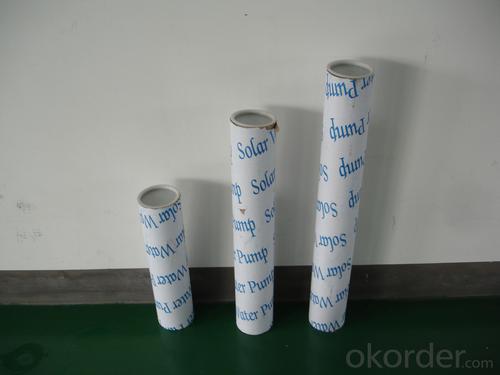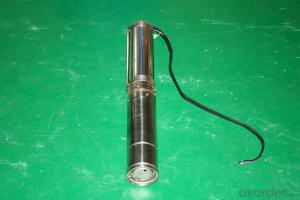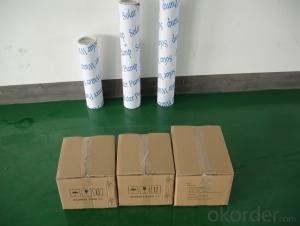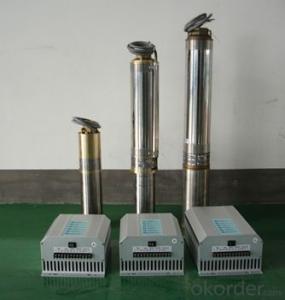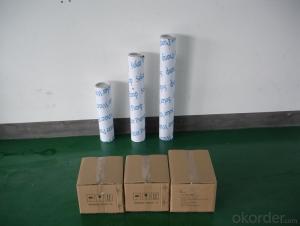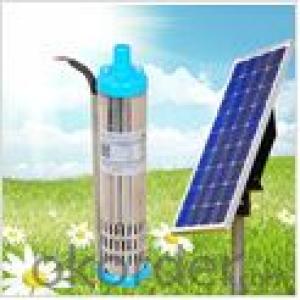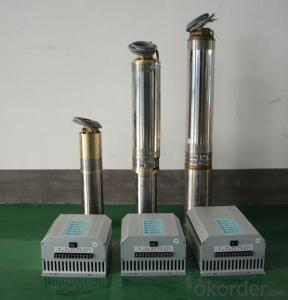Large Solar DC Submersible Pumps
- Loading Port:
- China Main Port
- Payment Terms:
- TT OR LC
- Min Order Qty:
- -
- Supply Capability:
- -
OKorder Service Pledge
OKorder Financial Service
You Might Also Like
Item Description :
This superb new addition to our solar fountain range comes with a 10w solar panel,and a powerful fountain pump that is capable of producing fountains of up to 2m in height. As well as being easy to set up and use.Instruction manual is supplied for assembly and maintenance.
Solar Fountain Key Features :
Powered by direct sunlight
No high voltage electric mains required
Safe for children
Max. height of fountain: 2M
Max. flow capacity: 800 L/H(176 GAL)
10W Polycrystalline solar panel included
18V DC brushless pump
Solar Pump Features :
Can produce fountains up to : 2M (tube height) 1.4M (fountain height)
Comes with multiple nozzle accessories
Cable Length : 5M
Solar Panel Features :
10W peak power.
Polycrystalline highly efficient solar panel
Comes mounted in aluminium frame
Comes with ground stake and rotating knob so you can angle your panel toward the sun
What You Will Get :
10W solar panel
Solar pump
Ground Sake
Nozzle accessories
Precautions :
DO NOT alter or change the product itself or its components
Operate pump in freshwater only, never above 50 degrees celsius
Keep away from flammable liquids
Do not connect to any other power supply other than the included
- Q: Can a solar pump be used for fish ponds or aquaculture?
- Yes, a solar pump can be used for fish ponds or aquaculture. Solar pumps are an eco-friendly and cost-effective option for circulating and aerating the water in fish ponds. They can help maintain water quality by adding oxygen to the pond, which is essential for the health and well-being of the aquatic life. Solar pumps can also be used to create water currents, which can prevent the build-up of algae and other unwanted substances in the pond. Furthermore, solar pumps are typically low-maintenance and can operate in remote areas where access to electricity is limited. Overall, solar pumps are a sustainable and efficient solution for maintaining a healthy environment in fish ponds or aquaculture systems.
- Q: Can a solar pump be integrated with existing water infrastructure?
- Yes, a solar pump can be integrated with existing water infrastructure. Solar pumps are designed to be compatible with various types of water infrastructure systems, including irrigation systems, water supply networks, and even household plumbing systems. The integration process typically involves connecting the solar pump to the existing water infrastructure through pipes, valves, and fittings. This allows the solar pump to draw water from existing sources, such as wells or lakes, and distribute it to the desired locations. Additionally, solar pumps can be equipped with sensors and controllers that enable them to interact with the existing water infrastructure more efficiently, optimizing water flow and pressure. Overall, integrating a solar pump with existing water infrastructure offers a sustainable and cost-effective solution for pumping water while reducing reliance on conventional energy sources.
- Q: How do solar pumps handle water with high ammonia or chemical content?
- Solar pumps are typically not designed to handle water with high ammonia or chemical content. These pumps are primarily used for pumping clean water from wells, boreholes, or other sources. Water with high ammonia or chemical content can be corrosive and may damage the pump components. In such cases, it is recommended to use specialized pumps or pre-treatment methods to remove or neutralize the ammonia or chemicals before pumping with a solar pump.
- Q: Are there any environmental benefits of using a solar pump?
- Yes, there are several environmental benefits of using a solar pump. Firstly, solar pumps operate solely on renewable energy from the sun, which means they do not require any fossil fuels to function. This significantly reduces greenhouse gas emissions, air pollution, and dependence on non-renewable energy sources. Solar pumps effectively contribute to mitigating climate change and improving air quality. Secondly, solar pumps do not consume any water or natural resources during operation. They rely on solar panels to convert sunlight into electricity, powering the pump to draw water from underground or surface sources. This sustainable approach to water pumping helps conserve water resources and ensures their availability for other purposes such as agriculture, sanitation, and drinking water. Additionally, solar pumps are often used for irrigation purposes in agriculture. By utilizing solar power for irrigation, farmers can reduce their reliance on diesel generators or electric pumps powered by non-renewable energy sources. This leads to a significant reduction in carbon emissions and helps promote sustainable agricultural practices. Furthermore, solar pumps can be used in remote areas where access to electricity is limited or non-existent. In these locations, using solar pumps not only provides a clean and reliable source of water but also eliminates the need for costly and environmentally harmful alternatives such as diesel-powered generators or transporting fuel to power traditional pumps. In summary, using solar pumps offers various environmental benefits including the reduction of greenhouse gas emissions, air pollution, and water consumption, as well as promoting sustainable agriculture and providing clean water in remote areas.
- Q: How does the size of the solar pump motor affect its performance?
- The performance of the solar pump is significantly affected by the size of its motor. The motor size has a direct impact on both the power output and efficiency of the pump. When the motor is larger, it generally means that the power output is higher. As a result, there is an increased water flow and higher pressure. This is particularly important for situations that require pumping water over long distances or to higher elevations. With a larger motor, more force can be generated, allowing it to overcome friction and deliver water with greater speed and force. Furthermore, a larger motor has the capability to handle a higher workload and operate for longer periods without overheating. It can manage larger volumes of water and work more efficiently, thereby reducing energy consumption and improving the overall effectiveness of the solar pump system. Conversely, a smaller motor may have limitations in terms of power output and efficiency. It may struggle to provide sufficient water flow and pressure, especially for demanding applications. A smaller motor may also have a lower workload capacity, resulting in more frequent breakdowns and reduced longevity. Choosing the appropriate motor size is crucial and should align with the intended application and specific requirements of the solar pump system. Factors such as the desired water flow rate, required pressure, and the distance and elevation at which the water needs to be pumped are all essential considerations when determining the suitable motor size. To summarize, the performance of the solar pump is directly influenced by the size of its motor. A larger motor can offer higher power output, increased water flow, and improved efficiency, while a smaller motor may have limitations in these areas. Selecting the right motor size is essential to ensure optimal performance and reliability of the solar pump system.
- Q: Can a solar pump be used in remote locations?
- Yes, a solar pump can be used in remote locations. Solar pumps are ideal for remote areas where there is no access to grid electricity. They can operate using solar energy, which is abundant in most remote locations, making them a reliable and sustainable solution for water pumping needs.
- Q: Can a solar pump be used with a battery backup system?
- Yes, a solar pump can be used with a battery backup system. The battery backup system allows the solar pump to continue operating even when there is no sunlight, ensuring a consistent water supply.
- Q: Can a solar pump be used in sewage treatment plants?
- Yes, a solar pump can be used in sewage treatment plants. Solar pumps are commonly used in various types of water treatment systems, including sewage treatment plants. They offer a sustainable and environmentally friendly solution by harnessing solar energy to power the pumps, reducing reliance on fossil fuels and electricity from the grid. Solar pumps can effectively transfer and circulate sewage throughout the treatment process, contributing to the overall efficiency and cost-effectiveness of sewage treatment plants.
- Q: How efficient are solar pumps compared to traditional pumps?
- Solar pumps are highly efficient compared to traditional pumps. They utilize renewable energy from the sun to power the pumping system, eliminating the need for electricity or fuel. This not only reduces operational costs but also minimizes carbon emissions and dependence on fossil fuels. Additionally, solar pumps have a longer lifespan and require less maintenance, making them a more sustainable and cost-effective choice for various applications.
- Q: How to use solar panels to drive 50W of circulating water pump, what configuration needs, how to connect?
- Of the 24V motor 50W, it takes about 2A current.Therefore, the output current of the battery plate to be larger .... even if it is cloudy, but also make the motor have enough current to stabilize the work.
Send your message to us
Large Solar DC Submersible Pumps
- Loading Port:
- China Main Port
- Payment Terms:
- TT OR LC
- Min Order Qty:
- -
- Supply Capability:
- -
OKorder Service Pledge
OKorder Financial Service
Similar products
Hot products
Hot Searches
Related keywords
